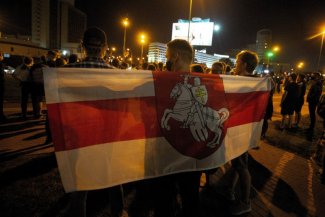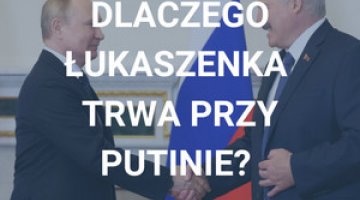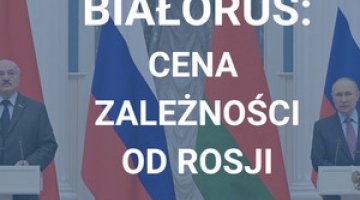The regime’s fight to survive: 100 days of political crisis in Belarus

The massive public protests against the rigging of the presidential election’s results which began on 9 August have led to the deepest political crisis in the history of independent Belarus. For the first time, a situation has arisen in which anti-regime demonstrations have been held for over three months, numbering over 100,000 people in the capital at the times of greatest mobilisation. Despite the fall in the number of protesters observed in recent weeks, the public’s anger is not waning, which is making it difficult for the authorities to control society. In response to the rebellion by a large number of its citizens, the regime has chosen the tactics of repression and intimidation. As a result, Belarusian authoritarianism is becoming more and more oppressive, gradually taking on the characteristics of a militia state. As he concentrates on keeping power, Alyaksandr Lukashenka has come to rely principally on the security sector, who see preserving the regime as a chance to hold onto their own privileges. In parallel to the increasing importance of the so-called siloviki in the government apparatus, Lukashenka has weakened the position of the civilian element of the nomenklatura. The regime is also pursuing an increasingly confrontational policy towards the West, to make it seem more credible that the protests have been inspired from abroad; in the economic sphere, economic reforms have been blocked as the regime focuses on controlling business. Lukashenka’s future may be decided by Russia, which is trying to use the crisis in the Belarusian system of power to gain full domination in Belarus.
The rising importance of the institutions of force
Out of fear of losing power, Lukashenka has come to rely even more on the institutions of force, whose loyalty is now the main factor guaranteeing his continued hold on the presidency. In recent months, high-ranking officers in the security structures have come to dominate the head of state’s inner circle and increased their influence on shaping Belarus’s policy. This privileged position for the so-called siloviki is primarily due to Lukashenka’s trust in these officers, who are accustomed to carrying out orders, and who believe that supporting the dictatorship will ensure that they maintain their own high material status and impunity. This is particularly important in the context of the brutal actions which law enforcement forces have taken against the participants in the demonstrations.
Realising the fundamental importance of the security sector, since the beginning of the post-election crisis Lukashenka has not once subjected their work to public criticism (which had previously been a part of the president’s ritual when hiring or firing staff), and no complaint from a member of the public about the use of violence has been considered positively. In addition, on 29 October Lukashenko decided to move the interior minister General Yuriy Karayeu, his deputy General Alyaksandr Barsukou, and the secretary of the Security Council General Valeryi Vakulchyk from their positions to the functions of presidential plenipotentiaries in the Hrodna, Minsk and Brest oblasts respectively.[1] Their tasks include not only suppressing demonstrations, but also supervising the local civil administration, including the governors – another sign that the apparatus of control and repression is tightening. It is worth mentioning that these nominations concern those regions of the country which have seen the most intense protests. At the same time, Lukashenka is increasingly promoting officers who have publicly advocated the use of violence against the demonstrating citizens; evidence of this can be seen in the 19 November decision to promote Mikalai Karpiankou, the director of a department in the Interior Ministry, to become that ministry’s deputy head, with command of the ministry’s internal troops[2].
A militia state?
The increasing importance of the so-called siloviki, with Lukashenka’s approval, is being translated into state policy, including in areas not directly related to the suppression of street demonstrations. One effect of this is the growing crackdown on private companies whose owners have supported the protests. This is being accompanied by an escalation of repression, consisting in both increasing the scale of brutality which the law enforcement forces use and the introduction of more systemic solutions, such as the application of criminal charges to demonstrators under Article 342 of the Criminal Code; this concerns the organisation of and active participation in activities that seriously violate public order, which is punishable by imprisonment of up to three years.
At present, Lukashenka’s narrative is dominated by a tendency, characteristic of the Belarusian security sector, to perceive reality through the prism of internal conspiracies and hostile actions by foreign governments which are allegedly seeking to subjugate Belarus. He has thus adopted a confrontational tone towards both the opposition and Western states, in particular, neighbouring Poland and Lithuania, as well as the US, which is allegedly supporting them. As a result, the dialogue with the West that had been ongoing since 2016 has been broken off. In this way, we may say that a militia state is being formed in Belarus, which, as it has lost the support of the majority of the population, is now primarily relying on brute force, extensive control, and the persecution of the regime’s critics. Lukashenka’s hostility towards the West and the opposition may also be being stoked by the Russians, something which could also aid the Belarusian security sector in creating a feeling of exterior threat.
The marginalisation of the civilian nomenklatura
The increased role of the institutions of force is being accompanied by the marginalisation of the civilian element in the Belarusian state apparatus. Foreign minister Uladzimir Makei, who had been a person of some influence before the elections, and was perceived as a skilful lobbyist in dialogue with the West, is now just the passive performer of Lukashenka’s confrontational foreign policy. The economic ministries have also lost importance, as they are of no use in combating the demonstrations, while at the same time they are inconvenient because of the overly realistic view of the state of the economy which prevails among them.
It seems that Lukashenka has also lost confidence in some of his officials who, in response to the dramatic events after 9 August, may have lost their taste for repressive behaviour, albeit to an extent which is hard to estimate. One external sign of this was the resignations of several dozen diplomats and employees of the president’s administration. In many cases, the civilian nomenklatura’s loyalty is based on the lack of any alternative in terms of employment, as well as fear of the consequences of opposing the official government line. In the longer term, this will cause problems in the day-to-day management of the state, in particular when it comes to pushing through socially unpopular decisions.
Imitating dialogue with the opposition
The regime has been pretending to hold public dialogue within a framework which it itself has set, in the form of discussions on changes to the constitution. To this end, since the beginning of October the Belarusian parliament has been receiving proposals from citizens for modifying the constitution, a process which has been accompanied by debates organised in the regions between loyal to the government experts and social activists. In November Yuriy Vaskrasensky, an activist from the election campaign of Viktar Babaryka (one of Lukashenka’s opponents), who had been released from arrest the previous month, announced the creation of a social organisation called the Round Table of Democratic Forces, the aim of which is to involve real opposition leaders in ‘dialogue’ with the authorities[3]. However, everything indicates that the process has been directed by the KGB from start to finish, and as such it is neither attractive nor credible to the vast majority of protesters who are demanding real changes, including the resignation of Lukashenka.
Still a rebellious society
As a result of restrictive regulations and pressure from the regime, conducting independent sociological research in Belarus has been seriously hampered since 2016, and is effectively impossible regarding the assessment of the public’s political preferences. Partial data has been provided by an online survey of nearly 900 urban residents conducted in October by the British think tank Chatham House. It shows that slightly over 20% of citizens voted for Lukashenka, and Sviatlana Tsikhanouskaya obtained 52% of the votes, which would have meant a victory for her in the first round. The study identified the divisions in Belarusian society as follows: opponents of the regime (43%); those who distance themselves from both sides of the conflict, but remain mostly positively disposed towards the protesters (33%); and supporters of the government (23%). Importantly, up to 83% of the respondents who admitted to having taken part in the post-election demonstrations expressed their readiness to continue their resistance until Lukashenka leaves office.
The survey also included the respondents’ preferences regarding foreign policy: only 9% of them supported Belarus’s rapprochement with the EU, while 26% supported closer integration with Russia as part of the Union State. The idea of working equally closely with Brussels and Moscow, which has been popular for many years in society (albeit not very realistic), had the most supporters, as much as 41%[4].
Although over recent weeks there has been a marked drop in the size of the Sunday demonstrations in Minsk (which is mainly due to repression, the deteriorating weather and fatigue at the length of the confrontation) from 100,000 to around 20,000, the level of social anger is still high. Over the past months, the civic awareness of some citizens has risen significantly. Belarusians are openly demanding changes, and have overwhelmingly rejected the imitations of dialogue which state media have promoted under the banner of constitutional reform. The public’s uncompromising attitude shows a complete lack of trust in Lukashenka, who has completely lost his legitimacy to continue to exercise power. As a result, the regime has effectively lost control over the majority of society, including entire professional groups (such as university lecturers, health care workers, private businesses and IT workers).
It is worth noting the great talent which the Belarusian people have displayed for organising grassroots support for victims of repression and establishing informal local communities among inhabitants of individual houses, housing estates or city districts; this significantly increases the chances of maintaining the resistance, even in conditions of oppressive terror and declining turnout at street demonstrations. In the long run, however, the weakness of the protest movement lies in the lack of a single coordinating centre which could manage it effectively.
The worrying economic situation
The post-election political crisis has made it more difficult for Belarus to overcome the recession that started this January, first due to the reduction of crude oil supplies from Russia to Belarusian refineries, and which was then exacerbated by the COVID-19 epidemic. As a result, despite the government’s optimistic assurances about returning to the path of growth, the country’s GDP has dropped in the following quarters, and it shrank by 1.1% in the period from January to October[5]. The basic problem, however, is the ineffective model of economic management; this is visible in the extensive state-owned industry, which still generates around 70% of the country’s GDP. To a great extent, the technologically obsolete state-owned plants are a burden on the national budget due to their problems with profitability and their growing indebtedness. During the first nine months of this year, the losses generated in industry amounted to US$2.2 billion, an increase of nearly sevenfold compared to the same period last year[6]. This is because some of these plants are dependent on supplies of Russian energy resources; the unfavourable climate in Minsk’s relations with Moscow means that conditions for these supplies have been less favourable for Belarus this year than in the past. Moreover, these enterprises’ high focus on exports (around 60% of domestic production goes abroad) makes a significant part of the economy dependent on the exchange rate of the rouble and the state of several key markets for Belarus.
The drastic drop in demand, the disruption of supply chains due to the pandemic, and the depreciation of the Belarusian rouble have naturally translated into the loss of some of the planned revenues from exports; the value from these in the period from January to September was around US$4 billion lower than in the corresponding period last year[7]. Private companies, which suffered as a result of the pandemic in the spring, and have subsequently been harassed by the government since 9 August, find themselves in a difficult situation because some entrepreneurs have become involved in the protests. This problem especially concerns the IT industry, which before the elections had been considered the most promising sector of the Belarusian economy, generating over 5% of the country’s GDP and 25% of service exports (worth US$2.5 billion). The repression against this group has forced some IT specialists (numbering several thousand) to transfer their activities to neighbouring Lithuania, Ukraine and Poland; this will certainly reduce the industry’s contribution to the development of the economy (although in the period from January to September, the share of the IT sector in GDP actually rose to over 7%)[8].
As a result, the Belarusian budget will close this year with a deficit of US$1.1 billion, compared to last year when a surplus of around US$1 billion was generated. The authorities are not concealing the fact that losses may exceed US$2 billion next year (i.e. 2.5-3% of GDP)[9]; in the absence of the country’s own resources, this will put pressure on the government to increase foreign debt (as of 1 October it amounts to US$17.5 billion, i.e. almost 29% of GDP) and reduce expenditure, for example on social benefits or wage increases in the state sector.
Moreover, the breakdown of the dialogue with the West and the regime’s radical domestic crackdown have undermined Belarus’s credit and investment credibility, which will effectively limit its hopes of refinancing its external debt to Russia, or possibly (although to a lesser extent) China. With next year’s external liabilities worth US$2.4 billion, maintaining the liquidity of the country’s debt repayment may prove very difficult, although as of 1 November the level of Belarus’s foreign exchange reserves is still at a safe level of US$7.4 billion[10].
The state apparatus, focused as it is on restoring control over society, may not be aware of the real threat of economic collapse; it not only fails to recognise the need to introduce any reforms, but also the need to stop repressing the private sector, including IT. The authorities continue to insist that they can restore GDP growth in 2021, although at this stage these are more propaganda messages than realistic economic strategies. As a result, the regime’s internal crackdown since August has been accompanied by the maintenance of the economic model based on a privileged state sector and government control over private entrepreneurs.
Seemingly close relations with Russia
In a situation of international isolation, Moscow remains Minsk’s main political ally, creditor, and supplier of energy resources. This gives Russia the opportunity to make an effective attempt to achieve its main goal since 2018 – to achieve real and deep integration within the Union State, which would ensure Russia’s lasting domination over Belarus. The Kremlin’s stronger bargaining position has prompted it to temporarily abandon the ‘31 roadmaps’ for the integration of the two countries which it had previously been pushing, in favour of constitutional reform. Russia has de facto made the extent of its further political and economic support conditional on changes to Belarusian constitutional law, which would weaken the president’s political position and make him even more vulnerable to Moscow’s pressure. It is also possible that the ultimate goal is to use the reforms to force Lukashenka to hold early elections in which he would not participate.
This is why Russian government representatives, including Vladimir Putin himself, have been referring to the issue of reform; they imply that only if this condition is met will Belarus be able to obtain the appropriate economic preferences, favourable conditions for gas and oil supplies, and new loans. In order to exert pressure, the Kremlin has been providing its support in very small doses: Putin did not participate in the ceremony opening the first bloc of the Belarusian Nuclear Power Plant in Astravyets on 7 November, and Minsk has received only US$500 million of the Russian loan granted it in September, most of which was used to pay off its debt to Gazprom[11]. The abovementioned restraint has also been accompanied by unconfirmed rumours about behind-the-scenes talks between the elites of both countries. Aware of the difficult international and economic situation in Belarus, Lukashenka is actually only simulating his full readiness to cooperate with Russia and carry out constitutional reforms.
Prospects for the regime
By opting for unprecedented repression against his rebellious citizens, Lukashenka has de facto deprived himself of any room for manoeuvre on the international arena – principally cooperation with the West, which before 9 August had been the natural counterbalance to Russian domination. Despite Minsk’s good relations with Beijing, steering the country in a non-European destination cannot compensate for the failure of its dialogue with the EU and the US.
Lukashenka’s dependence on support from the institutions of force will limit his options for changes in domestic policy. In this situation, Lukashenka will only be able to reduce the number of street protests in the near term through repression and intimidation. The lack of real dialogue with his opponents, the oppressiveness of the militia state and the limited foreign policy, combined with the preservation of the ineffective economic model, will mean that the regime can do nothing more than survive, while having no hope of emerging from the crisis.
At the same time, it cannot be ruled out that Lukashenka, who is threatened with an economic collapse and is coming under pressure from some of the nomenklatura, will yield to pressure from the Kremlin next year and agree to real constitutional reform, which will weaken his position or even cost him his hold on power.
[1] ’Лукашенко поставил перед новыми помощниками в регионах задачу по обеспечению общественной безоти’, Belta, 29 October 2020, www.belta.by.
[2] ‘Новая должность Карпенкова и другие перестановки в структуре МВД’, Naviny, 19 November 2020, www.naviny.media.
[3] ‘Воскресенский: члены КС сотрудничают со мной, но не предают это огласке’, Naviny, 11 November 2020, www.naviny.media.
[4] R. Astapenia, ‘What Belarusians think about their country’s crisis’, Chatham House, 21 October 2020, www.chathamhouse.org.
[5] Н. Калинина, ‘ВВП сократился на 1.1%, а «без предпринимателей экономика рухнет»’, Tut.by, 16 November 2020, www.news.tut.by.
[6] ‘Потери убыточных предприятий Беларуси подскочили почти в 7 раз’, Banki24.by, 16 November 2020, www.banki24.by.
[7] 'Внешняя торговля Республики Беларусь', Myfin.by, 10 November 2020, www.myfin.by.
[8] ‘Доля сектора связи и информатизации в ВВП Беларуси выросла до 7.3%’, Belta, 29 October 2020, www.belta.by.
[9] Д. Заяц, ‘Белорусская казна недосчиталась миллиардов рублей. Закрыть дыру нечем?’, Naviny, 6 November 2020, www.naviny.by.media.
[10] 'Золотовалютные резервы Беларуси на 1 ноября составили 7,5 млрд. долларов США' , Central Bank RB, 6 November 2020, www.nbrb.by.
[11] ‘Минфин Беларуси получил кредит на 500 млн долларов от ЕФСР’, Tut.by, 16 October 2020, news.tut.by.




